英语构词法训练-2
- 格式:docx
- 大小:32.78 KB
- 文档页数:8
![初中英语构词法汇总及练习[2]](https://uimg.taocdn.com/5db21c2e05087632311212e0.webp)
初中英语构词法汇总及练习(word版可编辑修改)编辑整理:尊敬的读者朋友们:这里是精品文档编辑中心,本文档内容是由我和我的同事精心编辑整理后发布的,发布之前我们对文中内容进行仔细校对,但是难免会有疏漏的地方,但是任然希望(初中英语构词法汇总及练习(word版可编辑修改))的内容能够给您的工作和学习带来便利。
同时也真诚的希望收到您的建议和反馈,这将是我们进步的源泉,前进的动力。
本文可编辑可修改,如果觉得对您有帮助请收藏以便随时查阅,最后祝您生活愉快业绩进步,以下为初中英语构词法汇总及练习(word版可编辑修改)的全部内容。
初中英语构词法汇总及练习一。
概念英语的构词法主要有二。
相关知识点精讲英语中,有的名词可作动词,有的形容词可作副词或动词,这种把一种词性用作另一种词性而词形不变的方法叫作转化法。
1)动词转化为名词很多动词可以转化为名词,大多意思没有多大的变化(如下①);有时意思有一定变化(如下②);有的与一个动词和不定冠词构成短语,表示一个动作(如下③)。
例如:① Let's go out for a walk. ______________________________②He is a man of strong build。
______________________________2)名词转化为动词很多表示物件(如下①)、身体部位(如下②)、某类人(如下③)的名词可以用作动词来表示动作,某些抽象名词(如下④)也可作动词.例如:① Did you book a seat on the plane? _____________________________?②Please hand me the book.____________________________________.③She nursed her husband back to health。
______________________________。
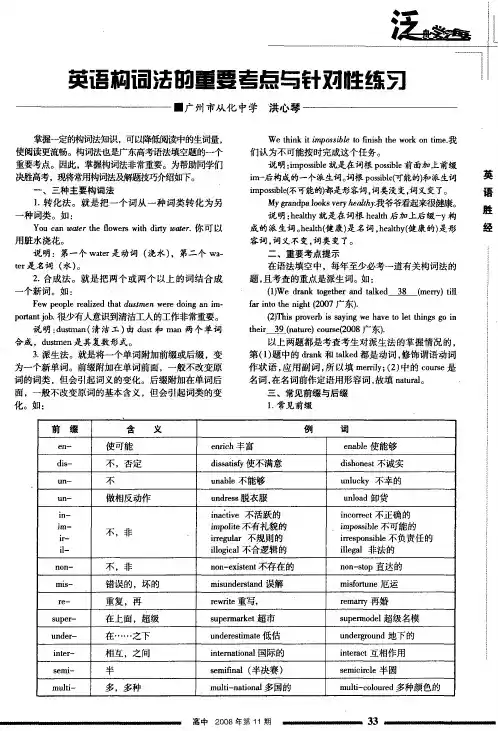

英语构词法总结与练习a合成法(1)合成是将两个或多个单词合成为一个单词。
复合词在英语中更活跃。
复合形容词很常见。
其中大多数用作定语,有些用作预测词;作为主语或宾语的复合名词;复合动词作谓语;作为状语的复合副词。
quick-servicecounter快餐部,airsick晕飞机,air-dropped空投,warm-heartedly热情地,sightseeing游览观光,cross-roads十字路口(2)合成形容词的构成方法如下:① 形容词/数字+名词+高尚、脾气好、热心、冷血、三条腿、独眼②形容词+现在分词good-looking好看的,fine-sounding动听的,easy-going香/臭,便宜③副词+现在分词hard-working勤劳的,far-reaching深远的ever-lastingrapidlycincreasinglong-sufferingnever-ending④名词/代词+现在分词:peace-loving热爱和平的,english-speakingmatch/flower-sellingflesh-eatingrecord-breakingself-lockingtime/gas-savingman-killing⑤名词+过去分词state-owned国有的,heartfelt由衷的self-taughtsnow-covered⑥ 副词+过去分词widely-usednewly-builtbadlycmanagedover-fed⑦ 形容词/数字+名词大型高级二手长距离高速活动耳机⑧ 名词+形容词duty-free免税的,airsick晕飞机的ice-coldhome-sick⑨另外还有其他方式构成的合成词,如:(3)合成名词的常见形式有:① 名词+名词silkworm蚕,bloodtest验血safetybelt,chinatown,trafficlight,shoelaceclassroom② 形容词+名词double-dealer两面派,shorthand速记③v-ing+名词候诊室,安眠药④ 动词+名词pickpocket扒手,break-water防水堤⑤名词+动名词笔迹书法⑥ 动词+副词get-together联欢会,break-through突破breakdowntake-offcheckcup⑦副词+动词⑨ 此外,许多副词和代词也是复合词,例如:maybe也许forever永远whole-hearted全心合意的myself我自己everything一切whatever不管什么moreover而且however但是nevertheless尽管如此B变换法:在不增加任何成分或改变词形的情况下,将一个词从一个词性转换为另一个词性的方法法叫转化法。
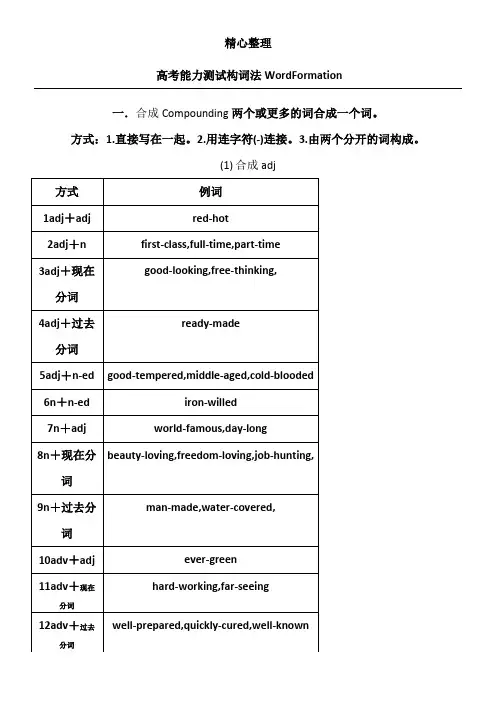
高考能力测试构词法WordFormation一.合成Compounding两个或更多的词合成一个词。
方式:1.直接写在一起。
2.用连字符(-)连接。
3.由两个分开的词构成。
(1)合成adj(2)合成动词(3)合成n(4)合成adv however,maybe,wherever,whenever,forever(5)合成代词whoever,,whatever,everyone,nobody,myself,something,anything,(6)合成介词inside 在……里二、派生Derivation类或几种词类。
1.名词和动词之间的转化telephone电话—打电话,mirror镜子—像镜子一样反映,drink喝—饮料,record录音—记录,name,date,hand,study,2.形容词转化为动词perfect完美的——使完善3.名词转化为形容词(副词)front前面——前面的4.形容词转化为名词chief主要的——首领训练要旨:构词法是英语学习的一个重点,也是近年来常考的项目。
特别是在词语辨析的综合运用中,对词汇掌握的要求越来越高。
检测构词法,在阅读理解中,已不把这种词汇看作生词,而是把这类词的理解看作学生通过对构词法知识的学习,应该具备的一种能力。
如有的生词,只要其词根是学生们该掌握的或熟悉的,只是加上了前缀或后缀,再者或是合成词等,命题人就认为不必再注出汉语注释。
1.Thatmanwas________enoughnottotellthemanagerthathewouldnotdothejob.A.careB.carefulC.carelessDcarelessness2.Thesoldierdiedforsavingthechild,sohis________isheavierthanMountTai.A.dieB.deadC.diedD.death3.Thechildlooked_______athisbrotherwhowasbadlywounded.A.sadlyB.sadnessC.sadlyD.sad4.Heisanexpertatchemistry.Weallcallhima________.A.chemistryB.chemicalC.chemisD.physician5.Thethree-________chairisn’tsuitableforayoungchild.Hemayfalloff.A.leggingB.leggedC.legsD.leged6.Stephensonbecamethe________railwayengineerintheworld.A.leadB.leaderC.leadingD.leadership7.Whentheteacherpraisedhimforworkingoutthemathsproblem,Jacklooked_______aboutathisclassmates.A.proudB.proudlyC.prideD.pridely8.Toeveryone’s________,thegirlfinishedthejobquitewell.A.satisfiedB.satisfactoryC.satisfyingD.satisfaction9.—Whatareyoudoinghere?—Oh,myteacheraskedmetowriteapassageabout________inEnglish. —Youcanwrite_______passageinEnglish?A.600words;a600-words B.600-word;a600-wordsC.600words;a600-wordD.600words;a600-words10.Nooneshouldenterthespotwithoutthe________ofthepolice.A.permitB.permissionC.permittingD.permittence11Youmustcomewithustothepolice_______.Ourheadiswaitingforyou.A.headquartersB.headlineC.headmasterD.headache12.Lettingthatanimalescapewasnoaccident;youdidit________.A.intendB.intentionC.intentionallyD.intentional13.Theshopownerwelcomedalltheguestswitha________smile.A.practiceB.practiseC.practicalD.practiced14.The_______orderedhimtopaya$100fine.A.judgerB.judgmentC.judgeD.judgement15.MyTVisoutoforder.Canyoutellmewhatisthe________newsaboutIraqWar?tter16.TheGreatWallismorethan6000liin________.A.longerB.lengthC.longD.longing17.Tomy________,Ipassedtheexameasily.A.joyB.joyfulC.joylessD.joyness18.Canadaismainlyan________country.A.English-speakingB.speak-EnglishC.spoken-EnglishD.English-spoken19.How________heis!Heisalwaysacting________.Heisreallya________.A.foolish;foolishly;foolB.fool;foolish;foolC.foolish;fool;foolD.foolishly;foolish;fool20.Thenecklacethatshelostisveryexpensive.It’sofgreat________.A.valuableB.valueC.valuelessD.unvaluable21.Therewere________fishintheriverinSouthAmerica.A.indangerB.dangerC.dangerousD.dangerless22.Thele tter“b”intheword“doubt”is________.A.soundB.silentC.silenceD.sounded23.Thechildlookedatme________.A.strangerB.strangelyC.strangeD.strangeless24.Theblackpeoplewereagainstslaveryandfoughtfortheir________bravely.A.freeB.freelyC.freedomD.frees25.Whatyousaidsounded________butinfactitwasuntrue.A.reasonableB.reasonfulC.reasonlessD.unreason26.Wehavetolearn________technologyfromothercountries.A.advanceB.advancingC.advantageD.advanced27.Thechildrenliveinavillage________.Theycomeherealmosteveryday.A.nearbyB.nearC.nearlyD.nearby28.MrBlackisan________inthearmy,notan________inthegovernment.Youcannoteasilyfindhiminhis________.A.official;officer;officeB.officer;office;officialC.official;official;officialD.officer;official;office29.You’dbettergiveupsmokingifyouwanttok eep________.A.healthB.healthyC.healthilyD.healthier30.________speaking,Ididn’tdoitonpurpose.A.HonestlyB.HonestC.HonestyD.Dishonest31.Itsoundslikeagoodplan,buttherearesome________difficultiesincarryingitout.A.practicedB.practicalC.practiceD.practicing32.Hisfatherpossessesa________factory,whichdoesmostofthepollutiontothisriver.A.paper-makeB.paper-makingC.papers-madeD.paper-made33.Marxlefthishomelandforsome________reasons.A.politicallyB.politicsC.politicalD.politician34.It’s________topersuadehimtogiveupsmoking.He’sverystubborn.A.possibleB.possiblyC.impossibleD.impossibility35.Dancaughttwo________birdsinthewoodlastweekandtheyarestill________inthecage.A.alive;liveB.live;liveC.live;aliveD.alive;alive36.Thedoctorsaidthatt heoldman’sconditionwas__andthattheyhadtriedtheirbest.A.hopeB.hopedC.hopefulD.hopeless37.Annfeltso________thatshecouldhardlyopenhereyes.A.sleepyB.asleepC.sleepD.sleeping38.Westoodthere______atthe_____sight.A.frightened;frightfulB.frighteningfrightfulC.fright;frighteningD.frightful;fright39.Thedoctor’sadvice________himfromdrinkingandsmoking.A.encouragedB.couragedC.encouragementD.discouraged40I’dliketobuyahouse,modern,comfortableandaboveallinaquiet_.A.neighbourB.neighbourhoodC.neighboursD neighbour’sⅡ.改错练习(每小题有一个构词法错误,请找出并更正)1.TheMiludee rarelivinginthewildinanaturalpark.2.Thisblouseisfitforhimatall.It’stoolongandthecolorhasrun.3.Thepossiblythatthemajorityofthelaborforcewillworkathomeisoftendiscussed.4.Wemuststrengthgovernmentofthepeople,bythepeopleandforthepeople.5.Thespermwhalecandivetoadeepofmorethan1000metersinthesea.6.Heisaveryfamousactress.Hehasplayedmanyimportantpartsindifferentfilms.7.Personal,I’dratherstayathomewatchingTV.8.Becauseofherill,shecan’tgooutforthesight-seeing.9.Thankyouforyourdescribeoftheconditionshere.10.It’sreallydustinthisroom.It’salongtimesincesomeonelastlivedinit.11.Wealldon’tknowhowdarkhappens.12.Heopenedtheenvelope,foldedtheletterandbegantoreadit.13.Sheoffereduslotsofvalueinformation,whichplayedanimportantpartincatchingthethief.14.Wewishyouapleasurejourneybackhome.15.Thecaptainmadeanapologizetothepassengersforthedelaycausedbybadweather.16.Iwishthatyoucouldinterviewthesejournalswhocome.17.Coralisnotaplantbutavariousofanimallife.18.Inmyopinion,Harryisthemostsuitfulpersonforthejob.19.Thefoodwasgoodbuttheservewaspoor. 20.Thismeetingisofgreatimportanttoallofus.21.Therecomesalargecollectionofsoldiersinthedistant.22.Whenhegottothedestination,hewasquiteoutofbreathe.23.Traditionallyspeaking,RussiaisaEuropecountry.24.“Actual”means“infact”,andwecanalsouse“asamatteroffact”.25.ItispossibletopersuadeAdamtogiveupthatdecide.26.Thedoctorsaidthatthepatiencewascomfortableaftertheoperation.27.Somepeoplesaythatthisnewdiscovermightchangethewholesocietycompletely.28.TheChinesegovernmenttreasurethefriendlybetweenthepeopleoftwocountriesandwearewaitingforapeacefulsettlementofthismatter.29.Shewasafraidofhighanddarednotjumpoutoftheplane.30.Hermotherdiedofhungryaftertheflood.31.Ibetyouaremistakethistime.32.Themansaidthathewasmerelyapass-byandthathedidn’twatchtheaccident.33.—Doyoufollowme?—Yes,perfect.34.PersonalpossessofgunscauseslotsoftroublesintheUSA.35.Thegreatestwealthyisbeingcontentwithalittle.36.Ibelieveourdreamthathumanswilltraveltoandfromthemoonwillcometruthoneday.37.Failisthemotherofsuccess.38.Everyyearmillionsofvisiterscometovisitthedams.39.TheChinesepeoplearebuildingsocialistandhaveachievedgreatprogress.40.Peopleallwentuptooffertheircongratulateontheirwinningthekeymatch.前后缀“冰山一角”练习一.形容词后缀1-ous结尾advantage________ambition________anxiety________continue________courage____ ____danger________disaster________fame________glory________humor________mo untain________mystery________nerve________number________poison________pros per________religion________suspicion________vary________vigor________2.以-al结尾Chemistry________class________economy________editor________education_______ _exception________finance________function________logic________memory_______ _nation________origin________parent________person________physics________politi cs________region________substance________technique________technology________3.以-able结尾ability________accept________access________adapt________avail________avoid___ _____capability________change________comfort_________compare________convert ________desire________duration________favor________flexibility________honor___ _____move________notice________permit________reason________sense________vision________4.以-ful结尾beauty________care________cheer________doubt________faith________fruit______ __glass________hand________harm________help________mouth________peace____ ____power________skill________spoon________success________thought________wonder________二名词后缀1.以-ment结尾achieve________advance________advertise________agree________disagree________argue________assign________attach________appoint________develop________emba rrass________encourage________engage________enjoy________equip________estab lish________govern________install________manage________move________pave____ ____pay________punish________ship________state________2.以-al结尾approve________disapprove________arrive________propose________refuse________remove________survive________try________withdraw________3.以-ance/-ence/-ency/cy结尾abundant________accurate________agent________allow________apply________atte nd________bankrupt________competent________compliant________confident_____ ___consist________convenient________inconvenient________correspondent_______ _current________dependent________independent________innocent________diploma t________distant________efficient________elegant________evident________exist___ _____fluent________frequent________infer________infant________influential______ __intelligent________interfere________offend________patient________perform____ ____prefer________refer________resident________significant________silent_______ _tend________urgent________vacant________violent________4.以-ion结尾act________add________admit________attract________associate________collect___ _____combine________complete________commit________communicate________co mpose________conclude________consider________consume________create________ decide________declare________define________describe________destroy________det ermine________devote________direct________distinct________discuss________dominate________educate________elect________evolve________except________exhaust_ _______exhibit________exploit________found________identify________illustrate___ _____imitate________impress________include________intend________introduce____ ____investigate________invite________liberate________locate________oblige______ __occupy________operate________organize________participate________permit____ ____predict________produce________provide________pollute________possess_____ ___recognize________recommend________regulate________relate________satisfy__ ______select________solve________submit________suggest________utilize________verify________三动词前后缀、1.以-en开头或结尾large________able________courage________rich________hard________weak_______ _broad________soft________moist________length________strength________threat-________sharp________sure________2.以-ify结尾magnified________simple________pure________intense________beauty________ clear________electrical________note________unite________dignity________3.以-ize/ise/yze/yse结尾real________industrial________mechanic________central________popular________e vaporation________standard________neutral________高考能力测试答案构词法Ⅰ.单项填空1~5BDACB6~10CBDCB11~15ACDCB16~20BAAAB21~25CBBCA26~30DADBA31~35BBCCC36~40DAADB【解析】6.leading主要的,领头的。
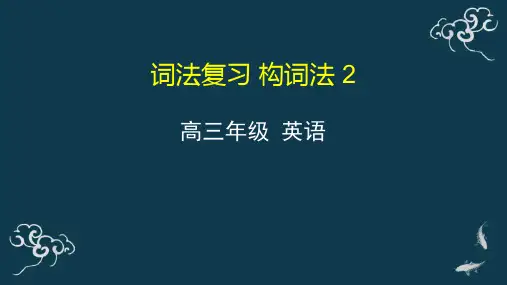
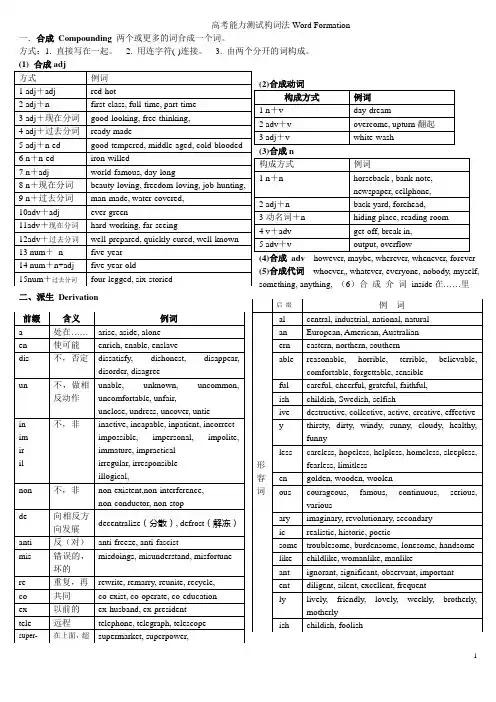
高考能力测试构词法Word Formation一.合成Compounding 两个或更多的词合成一个词。
方式:1. 直接写在一起。
2. 用连字符(-)连接。
3. 由两个分开的词构成。
(4)合成adv however, maybe, wherever, whenever, forever(5)合成代词whoever,, whatever, everyone, nobody, myself,something, anything, (6)合成介词inside在……里二、派生Derivation三、转化 Conversion : 指一个词不变化词形,而由一种此类转化为另一种词类或几种词类。
1. 名词和动词之间的转化telephone 电话—打电话, mirror 镜子—像镜子一样反映, drink 喝—饮料, record 录音—记录, name, date, hand, study,2. 形容词转化为动词 perfect 完美的——使完善3.名词转化为形容词(副词) front 前面——前面的4.形容词转化为名词 chief 主要的——首领训练要旨:构词法是英语学习的一个重点,也是近年来常考的项目。
特别是在词语辨析的综合运用中,对词汇掌握的要求越来越高。
检测构词法,在阅读理解中,已不把这种词汇看作生词,而是把这类词的理解看作学生通过对构词法知识的学习,应该具备的一种能力。
如有的生词,只要其词根是学生们该掌握的或熟悉的,只是加上了前缀或后缀,再者或是合成词等,命题人就认为不必再注出汉语注释。
1.That man was________enough not to tell the manager that he would not do the job.A.care B. careful C. careless Dcarelessness2.The soldier died for saving the child ,so his________ is heavier than Mount Tai. A. die B. dead C. died D. death3.The child looked_______ at his brother who was badly wounded. A. sadly B. sadness C. sadly D. sad4.He is an expert at chemistry. We all call him a ________. A. chemistry B. chemical C. chemis D. physician5.The three- ________chair isn’t suitable for a young child. He may fall off. A. legging B .legged C. legs D.leged6.Stephenson became the________railway engineer in the world. A. lead B. leader C. leading D. leadership7.When the teacher praised him for working out the maths problem ,Jack looked_______about at his classmates.A.proudB.proudlyC.prideD. pridely8.To everyone ’s ________, the girl finished the job quite well. A.satisfied B.satisfactory C.satisfying D.satisfaction 9.—What are you doing here? —Oh ,my teacher asked me to write a passage about ________in English. —You can write______ _passage in English? A.600 words ;a 600-words B.600-word ;a 600-wordsC.600 words ;a 600-wordD.600 words ;a 600-words10.No one should enter the spot without the________of the police. A.permit B.permission C.permitting D.permittence11You must come with us to the police _______.Our head is waiting for you.A.headquarters B.headline C.headmaster D.headache 12.Letting that animal escape was no accident ;you did it ________.A.intend B.intention C.intentionally D.intentional 13.The shop owner welcomed all the guests with a________smile. A.practice B.practise C.practical D.practiced 14.The_______ordered him to pay a $100 fine. A.judger B.judgment C.judge D.judgement15.My TV is out of order.Can you tell me what is the________news about Iraq War? tely test ter tter 16.The Great Wall is more than 6000 li in ________. A.longer B.length C.long D.longing 17.To my ________,I passed the exam easily. A.joy B.joyful C.joyless D.joyness18.Canada is mainly an________country. A.English-speaking B.speak-English C.spoken-English D.English-spoken 19.How________ he is! He is always acting________.He is really a ________.A.foolish ;foolishly ;foolB.fool ;foolish ;foolC.foolish ;fool ;foolD.foolishly ;foolish ;fool20.The necklace that she lost is very expensive.It’s of great ________. A.valuable B.value C.valueless D.unvaluable21.There were________fish in the river in South America. A.in danger B.danger C.dangerous D.dangerless22.The letter “b” in the word “doubt” is________. A.sound B.silent C.silence D.sounded23.The child looked at me________. A.stranger B.strangely C.strange D.strangeless24.The black people were against slavery and fought for their________bravely. A.free B.freely C.freedom D.frees25.What you said sounded________ but in fact it was untrue. A.reasonable B.reasonful C.reasonless D.unreason26.We have to learn________technology from other countries. A.advance B.advancing C.advantage D.advanced27.The children live in a village ________.They come here almost every day. A.nearby B.near C.nearly D.near by28.Mr Black is an ________in the army,not an________in the government.You can not easily find him in his________.A .official;officer;office B.officer;office;official C.official;official;official D.officer;official;office29.You’d better give up smoking if you want to keep ________.A.health B.healthy C.healthily D.healthier30.________ speaking,I didn’t do it on purpose. A.Honestly B.Honest C.Honesty D.Dishonest31.It sounds like a good plan,but there are some________difficulties in carrying it out.A.practicedB.practicalC.practiceD.practicing32.His father possesses a________factory,which does most of the pollution to this river.A.paper-makeB.paper-makingC.papers-madeD.paper-made33.Marx left his homeland for some________reasons. A.politically B.politics C.political D.politician34.It’s________to persuade him to give up smoking.He’s very stubborn.A.possible B.possibly C.impossible D.impossibility35.Dan caught two________birds in the wood last week and they are still________in the cage.A.alive;liveB.live;liveC.live;aliveD.alive;alive36.The doctor said that t he old man’s condition was__and that they had tried their best. A.hope B.hoped C.hopeful D.hopeless37.Ann felt so________that she could hardly open her eyes. A.sleepy B.asleep C.sleep D.sleeping38.We stood there______at the_____sight.A.frightened;frightful B.frightening frightful C.fright;frightening D.frightful;fright39.The doctor’s advice________him from drinking and smoking. A.encouraged B.couraged C.encouragement D.discouraged 40I’d like to buy a house,modern,comfortable and above all in a quiet_.A.neighbour B.neighbourhood C.neighbours D neighbour’s Ⅱ.改错练习(每小题有一个构词法错误,请找出并更正)1.The Milu deer are living in the wild in a natural park.2.This blouse is fit for him at all.It’s too long an d the color has run.3.The possibly that the majority of the labor force will work at home is often discussed.4.We must strength government of the people,by the people and for the people.5.The sperm whale can dive to a deep of more than 1000 meters in the sea.6.He is a very famous actress.He has played many important parts in different films.7.Personal,I’d rather stay at home watching TV. 8.Because of her ill,she can’t go out for the sight-seeing.9.Thank you for your describe of the conditions here. 10.It’s really dust in this room.It’s a long time since someone last lived in it.11.We all don’t know how dark happens.12.He opened the envelope,folded the letter and began to read it.13.She offered us lots of value information,which played an important part in catching the thief.14.We wish you a pleasure journey back home.15.The captain made an apologize to the passengers for the delay caused by bad weather.16.I wish that you could interview these journals who come. 17.Coral is not a plant but a various of animal life.18.In my opinion,Harry is the most suitful person for the job. 19.The food was good but the serve was poor.20.This meeting is of great important to all of us. 21.There comes a large collection of soldiers in the distant.22.When he got to the destination,he was quite out of breathe. 23.Traditionally speaking,Russia is a Europe country.24.“Actual”means“in fact”,and we can also use“as a matter of fact”.25.It is possible to persuade Adam to give up that decide.26.The doctor said that the patience was comfortable after the operation.27.Some people say that this new discover might change the whole society completely.28.The Chinese government treasure the friendly between the people of two countries and we are waiting for a peaceful settlementof this matter. 29.She was afraid of high and dared not jump out of the plane.30.Her mother died of hungry after the flood. 31.I bet you are mistake this time.32.The man said that he was merely a pass-by and that he didn’t watch the accident.33.—Do you follow me? —Yes,perfect.34.Personal possess of guns causes lots of troubles in the USA. 35.The greatest wealthy is being content with a little.36.I believe our dream that humans will travel to and from the moon will come truth one day.37.Fail is the mother of success. 38.Every year millions of visiters come to visit the dams.39.The Chinese people are building socialist and have achieved great progress.40.People all went up to offer their congratulate on their winning the key match.前后缀“冰山一角”练习一.形容词后缀1-ous结尾advantage________ ambition________ anxiety________ continue________ courage________ danger________ disaster________ fame________ glory________ humor________ mountain________ mystery________ nerve________ number________ poison________ prosper________ religion________ suspicion________ vary________ vigor________2. 以-al结尾Chemistry________ class________ economy________ editor________ education________ exception________ finance________ function________ logic________ memory________ nation________ origin________ parent________ person________ physics________ politics________ region________ substance________ technique________ technology________3. 以-able结尾ability________ accept________ access________ adapt________ avail________ avoid________ capability________ change________ comfort_________ compare________convert________desire________ duration________ favor________ flexibility________ honor________ move________ notice________ permit________ reason________ sense________ vision________4. 以-ful结尾beauty________ care________ cheer________ doubt________ faith________ fruit________ glass________ hand________ harm________ help________ mouth________ peace________ power________ skill________ spoon________ success________ thought________ wonder________二名词后缀 1. 以-ment结尾achieve________ advance________ advertise________ agree________ disagree________ argue________ assign________ attach________ appoint________ develop________ embarrass________ encourage________ engage________ enjoy________ equip________ establish________ govern________ install________ manage________ move________ pave________ pay________ punish________ ship________ state________2. 以-al结尾approve________ disapprove________ arrive________ propose________ refuse________ remove________survive________ try________ withdraw________3. 以-ance/-ence/-ency/cy结尾abundant________ accurate________ agent________ allow________ apply________ attend________ bankrupt________ competent________ compliant________ confident________ consist________ convenient________ inconvenient________ correspondent________ current________ dependent________ independent________ innocent________diplomat________ distant________ efficient________ elegant________ evident________ exist________ fluent________ frequent________ infer________ infant________ influential________ intelligent________ interfere________ offend________ patient________ perform________ prefer________ refer________ resident________ significant________ silent________ tend________ urgent________ vacant________ violent________4. 以-ion结尾act________ add________ admit________ attract________ associate________ collect________ combine________ complete________ commit________ communicate________ compose________ conclude________ consider________ consume________ create________ decide________ declare________ define________ describe________ destroy________ determine________ devote________ direct________ distinct________ discuss________ dominate________ educate________ elect________ evolve________ except________ exhaust________ exhibit________ exploit________ found________ identify________ illustrate________ imitate________ impress________ include________ intend________ introduce________ investigate________ invite________ liberate________ locate________ oblige________ occupy________ operate________ organize________ participate________ permit________ predict________ produce________ provide________ pollute________ possess________ recognize________ recommend________ regulate________ relate________ satisfy________ select________ solve________ submit________ suggest________ utilize________ verify________三动词前后缀、1.以-en开头或结尾large________ able________ courage________ rich________ hard________ weak________ broad________ soft________ moist________ length________ strength________ threat________sharp________ sure________ 2. 以-ify结尾magnified________ simple________ pure________ intense________ beauty________ clear________electrical________ note________ unite________ dignity________3. 以-ize/ise/yze/yse结尾real________ industrial________ mechanic________ central________ popular________ evaporation________ standard________ neutral________高考能力测试答案构词法Ⅰ.单项填空1~5 BDACB 6~10 CBDCB11~15 ACDCB 16~20 BAAAB21~25 CBBCA 26~30 DADBA31~35 BBCCC 36~40 DAADB【解析】6.leading 主要的,领头的。
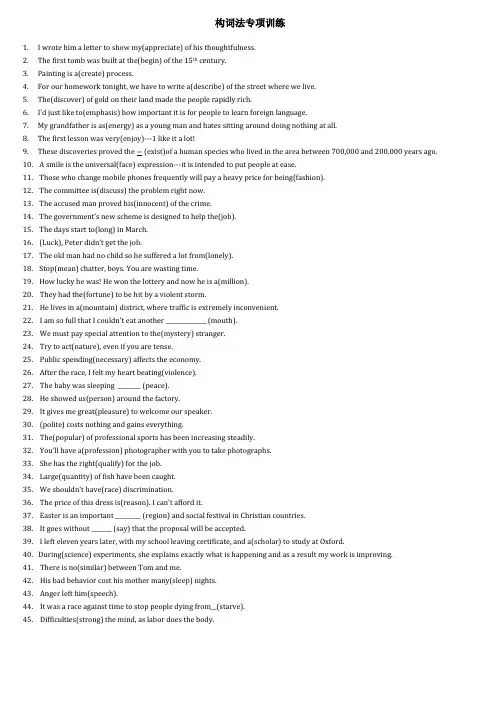
构词法专项训练1.I wrote him a letter to show my(appreciate) of his thoughtfulness.2.The first tomb was built at the(begin) of the 15th century.3.Painting is a(create) process.4.For our homework tonight, we have to write a(describe) of the street where we live.5.The(discover) of gold on their land made the people rapidly rich.6.I’d just like to(emphasis) how important it is for people to learn foreign language.7.My grandfather is as(energy) as a young man and hates sitting around doing nothing at all.8.The first lesson was very(enjoy)---1 like it a lot!9.These discoveries proved the ― (exist)of a human species who lived in the area between 700,000 and 200.000 years ago.10. A smile is the universal(face) expression---it is intended to put people at ease.11.Those who change mobile phones frequently will pay a heavy price for being(fashion).12.The committee is(discuss) the problem right now.13.The accused man proved his(innocent) of the crime.14.The government’s new scheme is designed to help the(job).15.The days start to(long) in March.16.(Luck), Peter didn’t get the job.17.The old man had no child so he suffered a lot from(lonely).18.Stop(mean) chatter, boys. You are wasting time.19.How lucky he was! He won the lottery and now he is a(million).20.They had the(fortune) to be hit by a violent storm.21.He lives in a(mountain) district, where traffic is extremely inconvenient.22.I am so full that I couldn't eat another ______________ (mouth).23.We must pay special attention to the(mystery) stranger.24.Try to act(nature), even if you are tense.25.Public spending(necessary) affects the economy.26.After the race, I felt my heart beating(violence).27.The baby was sleeping ________ (peace).28.He showed us(person) around the factory.29.It gives me great(pleasure) to welcome our speaker.30.(polite) costs nothing and gains everything.31.The(popular) of professional sports has been increasing steadily.32.You’ll have a(profession) photographer with you to take photographs.33.She has the right(qualify) for the job.rge(quantity) of fish have been caught.35.We shouldn't have(race) discrimination.36.The price of this dress is(reason). I can't afford it.37.Easter is an important _________ (region) and social festival in Christian countries.38.It goes without _______ (say) that the proposal will be accepted.39.I left eleven years later, with my school leaving certificate, and a(scholar) to study at Oxford.40.During(science) experiments, she explains exactly what is happening and as a result my work is improving.41.There is no(similar) between Tom and me.42.His bad behavior cost his mother many(sleep) nights.43.Anger left him(speech).44.It was a race against time to stop people dying from__(starve).45.Difficulties(strong) the mind, as labor does the body.46. A positive outlook is vital to dealing(success) with the crisis in adolescence and old age in our life.47.It is a colorless, odorless and(taste) gas, slightly heavier than air.48.He knew he had behaved badly and he seemed(true) sorry.49.This wounded soldier was(conscious) from his loss of blood.50.It’s(believe) that the event repeated itself years later in the same place.51.Overpopulation is a(universe) problem.52.More and more people choose to shop in a supermarket as it offers a great (vary) of goods.53.The(arrive) of migrant workers into the capital had seen Beijing’s population reach 17.4 million.54.Besides, many newspapers are printed daily and can offer the readers(rely) information.55.Girls make up only a small(percent) of students in computer science classes.56.I live in Hollywood. You may think people in such an ________________ (attract), fun-filled place are happier than others.Maybe that is because you haven’t noticed the(happy) they’ve concealed from you.57.In 2006, Taipei Zoo applied to host the pandas, Tuantuan and Yuanyuan, from the mainland. But the Taiwan government didn'tallow their(apply).58.Firstly, it(able) the Chinese people to know more about the outside world and promote(friend) and mutual understanding.59.Loss and(separate) are often what you find behind a child acting out in school.60.By saving money, people give themselves more(secure).61.Star sapphires and other(value) jewels worth a total of one million dollars are on show behind glass.62.If time could be turned back, allow me to take you back to December 26, 2004,(tradition), it is a time for family gathering, a timefor(celebrate).63.Because of the(popular) of TV and computers, they are getting much less exercise than before.64.“I would have no(object),”said the wolf, “if I could only get a place.”65.Some people have the feeling that nothing can be done about their poor reading(able).66.An ounce of luck is better than a pound of(wise).67.Researchers in Italy examined the tail wagging(behave) of 30 dogs.68.Another(convenience) feature of the EOL is that you'll be able to pick the level of detail you want to see to match your interested,age, and knowledge.69.Health problems are(close) connected with bad eating habits and a lack of exercise.70.You may(like) some types of food because they do not look, smell or taste very nice.71.What is more, it is true that computers can make(decide), but they need detailed instructions and programs prepared by humans tooperate.72.Then they chose three Broadway tunes that focused on race,(equal) and social justice, the themes of the book.73.As I lined up for the start I glanced at the flag. It moved __________________ (gentle) now.74.Some people have the feeling that nothing can be done about their poor reading ability. They feel (hope) about it.75.An important new study into teenage attitudes surprisingly shows that their family life is more (harmony) than it has ever been inthe past.76.The(inform) gained helped up in determining where special attention should be paid in our course.77.In the following account, she recalls the job that challenged her(imagine) and skill but left her flying high.78. A thousand words will not leave so deep an(impress) as one deed.79.And I included only those books over a hundred pages in(long).80.Keep your eyes wide open before(marry), and half shut afterwards.81.Reading comprehension can’t be(dependent) from the knowledge of writing.82.(music) often called him Pops, as a sign of respect for his influence on the world of music.83.The northern city of Turin passed a law in April to give pet(own) fines of up to $598 if they do not walk their dogs three times aday.84.So far, scientists have named about 1.8 million living species, and that’s just a small number of what(probable) exists on Earth.85.Men can do nothing without its _________________ (permit), and it fastens its young round people’s wrists so thateverywhere men go they are still under its control.86.The best(prepare) for good work tomorrow is to do good work today.87.He answered me(rude) and said he would not come back.88.As his university was aware of the(significant) of his work, they gave him free time to do this research.89.Cuzco is a lively city where both Indian and(Spain) culture and are can be seen.90.The best time to visit New Zealand is from November to April---summer time in the (south) hemisphere.91.Jo went to New York and became(succeed) in her writing and had the(satisfy) of seeing her work published there.92.(like) other camp programs that include horses as a small part of their program, at Shadow Ridge horses are the program!93.The smell is, as usual, almost(bear), being a mixture of sweat and dirty underwear.英语构词通常包括六种方法:转化法、派生法、合成法、混合法、截短法和首尾字母结合法。

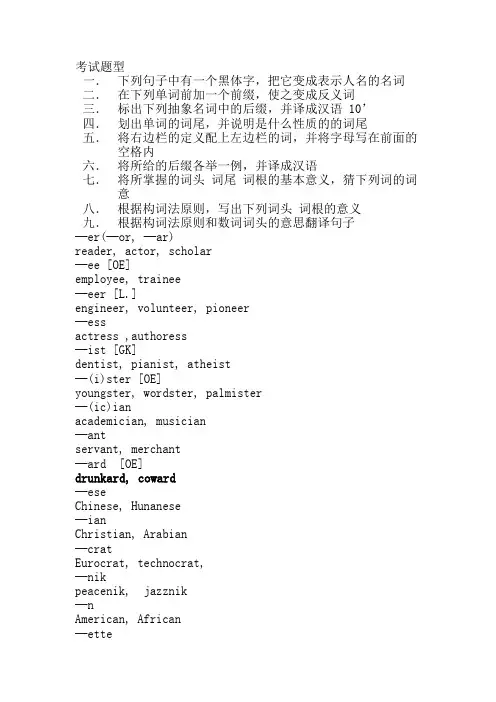
考试题型一.下列句子中有一个黑体字,把它变成表示人名的名词二.在下列单词前加一个前缀,使之变成反义词三.标出下列抽象名词中的后缀,并译成汉语 10’四.划出单词的词尾,并说明是什么性质的的词尾五.将右边栏的定义配上左边栏的词,并将字母写在前面的空格内六.将所给的后缀各举一例,并译成汉语七.将所掌握的词头词尾词根的基本意义,猜下列词的词意八.根据构词法原则,写出下列词头词根的意义九.根据构词法原则和数词词头的意思翻译句子─er(─or, ─ar)reader, actor, scholar─ee [OE]employee, trainee─eer [L.]engineer, volunteer, pioneer─essactress ,authoress─ist [GK]dentist, pianist, atheist─(i)ster [OE]youngster, wordster, palmister─(ic)ianacademician, musician─antservant, merchant─ard [OE]drunkard, coward─eseChinese, Hunanese─ianChristian, Arabian─cratEurocrat, technocrat,─nikpeacenik, jazznik─nAmerican, African─ettecigarette, statuette, roomette─kinlambkin, manikin, prince kin─letkinglet, booklet, ringlet─lingduckling, prince ling, birdling ─enmaiden, chicken, kitten─elparcel,model,citadel─etfloweret, islet, tag let─cleparticle, molicle─(e)teriafruiteria, grocerteria二.加前缀法.表示否定的前缀:A.纯粹表示否定的有:a-,dis-,in-,non-,un-;B.表示“错误”的有:mis-C.表示“反动作”的有:de-,dis-,un-D.表示“反对”的有:anti-,contra-,counter-atypicalamoralatheism 无神论asexual 无性别的anonymous在辅音h(不发音)之前也用an-:anarchism无政府主义dishonestdisagreedisallow 不许,拒绝discouragedisforest 砍伐树林dissolvedispel 驱散inhuman不人道的illegalImmoralirresponsibleirresistible 不可抵抗nonconductor 非导体nonmetal 非金属的nonstopnon-standard 不标准的unhappyuncomfortableunsystematic无系统的unlimitedunworldly非现世的uneducatedUncivilized未开化的misbehave行为不当misprintmisplay(球类等运动中)失误misleadingdevaluation贬值de-表示“remove from”deport驱逐出境deforest砍伐森林degas 排气消除毒气unbutton 解纽扣uncover 揭开盖子untomb从坟墓中掘出antipathy 憎恶anti-Japanese war 抗日战争antidote 解毒药antacid 防酸剂Antarctic 南极contradict反驳 ,同…相矛盾contrary 相反的counteract 还手counterplot 将计就计counterview 反对意见retroact 倒行,起反作用retrospect 回顾 retrogress倒退三.抽象名词词尾•─age•marriage, shortage, postage•─al•approval, denial, refusal•─ance•assistance, elegance,brilliance•─cy•accuracy, Intimacybankrupcy•─dom•freedom, wisdom, filmdom•─ful•glassful, handful, houseful•─hood•fatherhood, Childhoodneighborhood•─ing•bedding, learning, washing•─ism•Marxism, socialism, Londonism•─ity (-ty)•curiosity, majority, unity,•safety•─ment•argument, development, instrument•─ness•friendliness, goodness, carelessness •─ship•authorship, citizenship, leadership•─ure•failure, departure, closure, exposure ---ery, --ry•robbery, greenery, nurserysurgery, slavery, poultry, poetry•─®ama•telerama, cinerama•─itis•appendicitis(阑尾炎)odontitis(牙炎),neuritis(神经炎)•─th•growth, warmth, fourth四.单词词尾☐加否定前缀“in- (及其变体)”, ‘‘non-, un-” 构成下列单词的反义词:☐1. im mature 2. ir regular☐3. in considerate 4. ig noble☐5. non-contentious☐6. il legitimate☐7. non-metal☐8. im passive☐9. non-ferrous☐10. in accuracy☐11. un endurable☐12. in variance☐13. non-inductive☐14. il legible☐15. un reasonable☐16. ir rational☐17. un scrupulous☐18. non-staple☐19. im balance☐20. il legalize☐写出下列单词中前缀的意思:☐1. ante cedent 2. by product☐3. in clude 4. intra mural☐5. intro spect 6. post graduate☐7. pre cede 8. retro spect☐9. super man 10. pro ceed☐11. sub scribe 12. trans mit☐13. ultra-red 14. a pocopeEx. 2写出表示数目的希腊语前缀和拉丁语前缀:☐希腊语前缀拉丁语前缀☐half hemi- demi-, semi-,☐one mono- uni-,☐two di-, duo-, bi-☐three tri-☐four☐five☐six☐seven☐eight☐nine☐ten☐hundred☐thousand将右边栏里的定义配上左边栏里的词, 并将字母在前面的空格内 :☐1. ___ audio logy a. the study of speech sound☐2.___ audiometer b. an instrument used tomake weak sounds louder☐3. ___ chronometer c. the science of hearing☐4. ___ microphone d. in instrument formeasuring time accurately☐5. ___ phonology e. an instrument formeasuring hearing☐6. __ superscript a. the examinationof one’s own thought☐7. __ transmit b. to draw a linearound☐8. __ supervisor c. to send from oneperson or place to another ☐9. __ circumscribe d. a boss☐10. __ introspection e. letter orsomething written above ☐11. __ manual a. the belief that there is onlyone god☐12. __ monogamy b. the science or study of religious truth☐13. __ monotheism c. giving no name☐14. __ theology d. done by the hand orhands☐15. __ anonymous e. the practice or condition ofhaving onemarriage partner☐16. __ archenemy a. a mistake in printing☐17. __ sympathy b. the chief bishop☐18. __ archbishop c. a hearer orlistener☐19. __ auditor d. a chief or mainopponent☐20.__ misprint e. agreement in feelings between persons☐21. __ corpse a. a passage to one side☐22. __ decapitate b. fat; large ofbody☐23. __ corpulent c. to cut off thehead of☐24. __ bypass d. a dead body☐25. __ portage e. fat; large of body☐26. __ biology a. believe it☐27. __ credit b. the study of science☐28.__ uniform c. throw away☐29.__ retrogress d. go back☐30.__ eject e. one form☐31. __ corpse a. a passage to one side☐32. __ decapitate b. fat; large of body☐33. __ corpulent c. to cut off the head of☐34. __ bypass d. a dead body☐35. __ portage e. fat; large of body☐36. __biology a. believe it☐37.__credit b. the study of science☐38.__uniform c. throw away☐39.__retrogress d. go back☐40.__eject e. one form根据所掌握的词头、词根、词尾的基本意义,猜出划线部分单词或词组的意思。
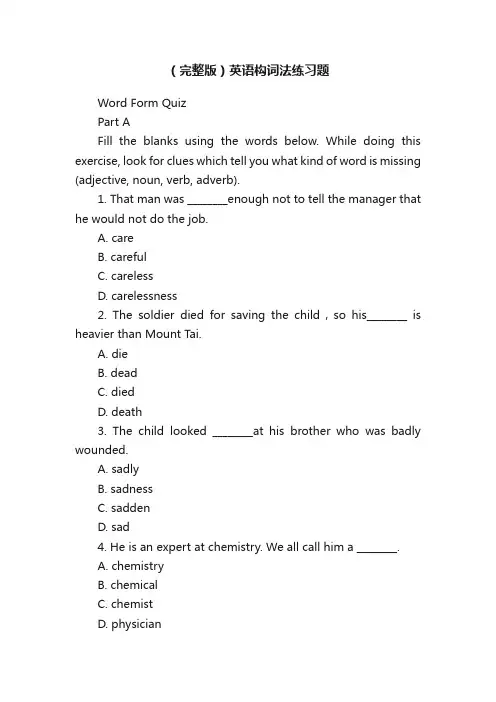
(完整版)英语构词法练习题Word Form QuizPart AFill the blanks using the words below. While doing this exercise, look for clues which tell you what kind of word is missing (adjective, noun, verb, adverb).1. That man was ________enough not to tell the manager that he would not do the job.A. careB. carefulC. carelessD. carelessness2. The soldier died for saving the child,so his________ is heavier than Mount Tai.A. dieB. deadC. diedD. death3. The child looked ________at his brother who was badly wounded.A. sadlyB. sadnessC. saddenD. sad4. He is an expert at chemistry. We all call him a ________.A. chemistryB. chemicalC. chemistD. physician5.The three- ________chair isn’t suitable for a young child. He may fall off.A. leggingB. leggedC. legsD. leged6. Stephenson became the________railway engineer in the world.A. leadB. leaderC. leadingD. leadership7.When the teacher praised him for working out the maths problem,Jack looked________about at his classmates.A. proudB. proudlyC. prideD. pridely8.To everyone’s ________,the girl finished the job quite well.A. satisfiedB. satisfactoryC. satisfyingD. satisfaction9.—What are you doing here?—Oh,my teacher asked me to write a passage about ________in English.—You can write________passage in English?A. 600 words;a 600-wordsB. 600-word;a 600-wordsC. 600 words;a 600-wordD. 600 words;a 600-words10. No one should enter the spot without the________of the police.A. permitB. permissionC. permittingD. permittence11. You must come with us to the police ________.Our head is waiting for you.A. headquartersB. headlineC. headmasterD. headache12.Letting that animal escape was no accident;you did it ________.A. intendB. intentionC. intentionallyD. intentional13. The shop owner welcomed all the guests with a________smile.A. practiceB. practiseC. practicalD. practiced14. The________ordered him to pay a $100 fine.A. judgerB. judgmentC. judgeD. judgement15. My TV is out of order. Can you tell me what is the________news about Iraq War?A. latelyB. latestC. laterD. latter16. The Great Wall is more than 6000 li in ________.A. longerB. lengthC. longD. longing17.To my ________,I passed the exam easily.A. joyB. joyfulC. joylessD. joyness18. Canada is mainly an________country.A. English-speakingB. speak-EnglishC. spoken-EnglishD. English-spoken19. How________ he is! He is always acting________.He is reallya ________.A. foolish;foolishly;foolB. fool;foolish;foolC. foolish;fool;foolD. foolishly;foolish;fool20. The necklace that she lost is very expensive. It’s of great ________.A. valuableB. valueC. valuelessD. unvaluable21. There were________fish in the river in South America.A. in dangerB. dangerC. dangerousD. dangerless22.The letter “b” in the word “doubt” is________.A. soundB. silentC. silenceD. sounded23. The child looked at me________.A. strangerB. strangelyC. strangeD. strangeless24.The black people were against slavery and fought for their________bravely.A. freeB. freelyC. freedomD. frees25. What you said sounded________ but in fact it was untrue.A. reasonableB. reasonfulC. reasonlessD. unreason26. We have to learn ________technology from other countries.A. advanceB. advancingC. advantageD. advanced27. The children live in a village ________.They come here almost every day.A. nearbyB. nearC. nearlyD. near by28.Mr Black is an ________in the army,not an ________in the government. You can not easily find him in his________.A. official;officer;officeB. officer;office;officialC. official;official;officialD. officer;official;office29.You’d better give up smokin g if you want to keep ________.A. healthB. healthyC. healthilyD. healthier30.________ speaking,I didn’t do it on purpose.A. HonestlyB. HonestC. HonestyD. DishonestPart BUse the word at the end of each gap to form a new word with which to fill the gap. While doing this exercise, look for clueswhich tell you what kind of word is missing (adjective, noun, verb, adverb). Make sure to take into consideration forms using various prefixes and suffixes, as well as negative forms.We earn our_____________ (LIVE) in America today in peaceful ____________ (COMPETE) with people all across the Earth. Profound and _________ (POWER) forces are shaking and _________ (MAKE) our world, and the urgent question of our time is whether we can make change our friend and not our enemy. This new world has already ___________ (RICH) the lives of millions of Americans who are able to ____________ (COMPETITION) and win in it. But when most people are working harder for less, when others cannot work at all, when the cost of health care devastates families and threatens to ____________ (BANK) our enterprises, great and small, when the fear of crime robs law abiding citizens of their _____________ (FREE), and when millions of poor children cannot even imagine the lives we are calling them to lead, we have not made change our friend.Some Tips1.V-ing和V-ed 作形容词时的差别表示情感的及物动词如excite, discourage, disappoint, encourage, inspire, interest, move, please, puzzle, surprise, worry 等,其分词常加上后缀-ing或-ed转化为分词(也可称为形容词),用作表、定、状或补语。
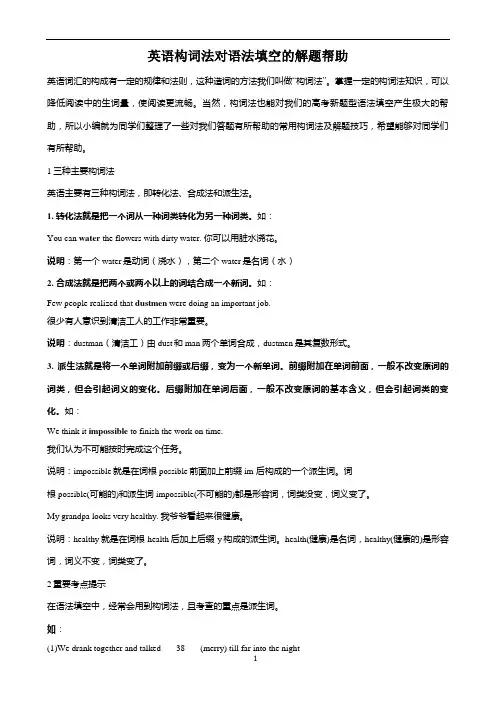
英语构词法对语法填空的解题帮助英语词汇的构成有一定的规律和法则,这种造词的方法我们叫做“构词法”。
掌握一定的构词法知识,可以降低阅读中的生词量,使阅读更流畅。
当然,构词法也能对我们的高考新题型语法填空产生极大的帮助,所以小编就为同学们整理了一些对我们答题有所帮助的常用构词法及解题技巧,希望能够对同学们有所帮助。
1三种主要构词法英语主要有三种构词法,即转化法、合成法和派生法。
1. 转化法就是把一个词从一种词类转化为另一种词类。
如:You can water the flowers with dirty water. 你可以用脏水浇花。
说明:第一个water是动词(浇水),第二个water是名词(水)2. 合成法就是把两个或两个以上的词结合成一个新词。
如:Few people realized that dustmen were doing an important job.很少有人意识到清洁工人的工作非常重要。
说明:dustman(清洁工)由dust和man两个单词合成,dustmen是其复数形式。
3. 派生法就是将一个单词附加前缀或后缀,变为一个新单词。
前缀附加在单词前面,一般不改变原词的词类,但会引起词义的变化。
后缀附加在单词后面,一般不改变原词的基本含义,但会引起词类的变化。
如:We think it impossible to finish the work on time.我们认为不可能按时完成这个任务。
说明:impossible就是在词根possible前面加上前缀im-后构成的一个派生词。
词根possible(可能的)和派生词impossible(不可能的)都是形容词,词类没变,词义变了。
My grandpa looks very healthy. 我爷爷看起来很健康。
说明:healthy就是在词根health后加上后缀-y构成的派生词。
health(健康)是名词,healthy(健康的)是形容词,词义不变,词类变了。
构词法练习11.That man was ___careful____(careful)enough not to tell the manager that he would not do the job.2.The soldier died for saving the child,so his ___death____(die) is heavier than Mount Tai.3.The child looked ___sadly____(sad)at his brother who was badly wounded.4.He is an expert at chemistry. We all call him a _chemist___. (chemistry)5.The three- _legged______(leg)chair isn’t suitable for a young child. He may fall off.6.Stephenson became the __leading_(lead)railway engineer in the world.7.When the teacher praised him for working out the maths proble,Jacklooked_pridely____(pride)about at his classmates.8.The shop owner welcomed all the guests with a__ practiced__(practice)smile.9.My TV is out of order. Can you tell me what is the_latest__ (late)news about Iraq War?10.The Great Wall is more than 6000 li in ____length____. (long)11.To my____ joy____,(joy)I passed the exam easily.12.How___foolish____ he is! He is always acting ___foolishly_.He is really a ___fool_. (fool)13.The necklace that she lost is very expensive. It’s of great _value_.(value)14.There were_dangerous____(danger)fish in the river in South America.15.The child looked at me __strangely_____. (strange)16.The black people were against slavery and fought for their_freedom_______(free)bravely.17.The children live in a village _nearby__.(near)They come here almost every day.18.Mr Black is an _officer_in the army,not an _official___in thegovernment. You can not easily find him in his_office_____. (office)19.You’d better give up smoking if you want to keep _healthy__. (health)20.___Honestly_____ speaking,I didn’t do it on purpose. (honest)构词法练习题21. It’s October the _ninth__(nine). It’s my mother’s birthday.2. Congratulations!(恭喜) Both of you are the _winners____(win) of the match.3. Computers and printers are now _widely__(wide) used in many companies.4. She was so _careful___(care) that she took my umbrella by mistake.5 .Look at the sun. It always shines _brightly_(bright) in the sky.6. Miss Smith put the new dress on, and looked at __herself___ (she) in the mirror.7. I think the dictionary is _helpful__ (help) to your study.8. Don’t open your books. Please keep them _closed____.(close)9. Children should speak to old people __politely___(polite).10. The time is too short. It’s _impossible___(possible) for Daniel to finish this work.11. Paper catches fire _easily__(easy).12. My sister is _unhappy___(happy) now because she lost her money.13. You have to believe in _yourself__(you) . That’s the secret of success.14. I don’t like travelling by plane. I think it’s _unsafe___ (safe) to travel by air.15 .He speaks Chinese very well though he is a _Canadian____(Canada).16. You may be _worried__ (worry) if you are in trouble and have no oneto help you.17. It’s very _exciting__ to go hiking into the mountains. I’m _excited__ about it.(excite)18 .Beijing is such an _interesting___ city that I’m _interested__ in it very much. There are many places of __interest___(interest).19. The students are listening to the teacher _carefully__(care).20. He’s too old. But he __really__(real) loves plays.21. This lake is _dangerous__(danger) for swimmers.22 .There are a lot of _travellers___(travel) on the train.24. Geography is a _natural___(nature) science. Do you know?27. The driver was very _thankful__(thank) to the policeman for his help.28. Now there was enough light, so the doctor was able to see _clearly___(clear).29. Yunnan University has a long history. It has celebrated its _eightieth_ (eighty) birthday.30.Congratulations on crossing the channel _successfully___(success)!31. How can I improve my _spoken__(speak) English?32. It’s _sunny___(sun) today. Let’s go swimming.33. It rained _heavily____(heavy), so he didn’t go to work yesterday.34 .July is the _seventh___(seven) month of the year.35. Shanghai is in the _eastern___(east) past of China.36. Mrs. Smith smiled _happily___(happy) when she received a presentfrom her son on Mother’s Day.37. Go _across_(cross) the bridge. You’ll find the library on the left.38. The woman looked at the young man _angrily__(angry) and didn’t say a word.39. Rosa eats _less_(little) food than he sister.41. Children need time and _freedom__(free) to have fun.42 .I did rather _badly__(bad) in the race.44 .Lily felt sad because the bird was _died_(die).45 .He put his other shoe under his bed very _quietly__(quiet).47. Godless me! Your _pronunciation___(pronounce) is very good.48. Could you lend me your bike? Mine is _broken___(break).49. It’s a _rainy__ day. Do you still want to swim? (rain)50 .She _nearly__ missed the train this morning. ( near)51. The boy wants to be a _writer__ when he grows up. ( write).52. Her little daughter can study by herself now and the mother is very _pleased_.(please )53 .Are you sure the dish taste _good__? (good)54. When someone knocked at the door, the old man was just falling _asleep__(sleep)55 .Is he the best _player__ in the diving team? (play)56. My uncle _teaches__ me to play the violin every evening. (teacher)57. Mr. Smith is such an _honest__ man that we all trust him. ( honest)58. Today Linda’s parents are out, she has to stay at home _alone_. (lonely)59. What’s the weather like today? It’s _windy__. (wind)60. When spring comes, the snow disappears____(appears).。
初升高英语衔接第一章基础知识衔接专题二构词法原卷版一、根据具体语境,选出合适的选项。
1.Zhong Nanshan, ____ doctor, became a hero again in the fight against COVID-19(新冠肺炎) in the spring of 2020.A. a 83-year-oldB. an 83-year-oldC. an 83 years oldD. a 83 years' old2.–Do you know Li Ying?–Yes. She is____girl from Shanghai.A. an eleven-years-oldB. a eleven-year-oldC. an eleven-year-oldD. eleven years old3.Tina is only ____ girl, but she can draw very well.A. a 8-year-oldB. an 8 years oldC. an 8-year-oldD. a 8 years old4.My parents always have a _______ holiday in the Spring Festival.A. seven daysB. seven day'sC. seven-day5.Peter is a _______ boy with glasses. He likes reading books very much.A. nine years oldB. nine year oldC. nine-years-oldD. nine-year-old6.Look! There is _______ over there. Do you know him?A. a 8-year-old boyB. an 8-year-old boyC. a 8-years old boyD. an 8-years old boy7.Bill said they would have _____ holiday.A. a three-dayB. three daysC. three-daysD. three-dayˈs8.Daming isn't careful, he speaks English very __________(care).1.careful B. carefully C. careless D.carelessly2.9.It's really ___________ (amaze) to know that there're only seven bones in giraffes'long necks.3.A.amazingB. amazedC.amazinglyD.amazement4.10.One of my best friends __________ (success) won a scholarship to HarvardUniversity at the age of 18.5.A.successfulB. succeedC. successfullyD.unsuccessful6.二、根据括号内的提示词,写出其正确形式。
高中英语词汇构词法分析练习题40题1.The blackboard is in the front of the classroom. What's the meaning of "blackboard"?black+boardA.black 黑色的,board 木板,合成词“blackboard”意为黑板。
2.The classroom is very bright. What's the meaning of "classroom"?class+roomA.class 班级、课,room 房间,合成词“classroom”意为教室。
3.The schoolbag is heavy. What's the meaning of "schoolbag"?school+bagA.school 学校,bag 包,合成词“schoolbag”意为书包。
4.The football field is very large. What's the meaning of "football"?foot+ballA.foot 脚,ball 球,合成词“football”意为足球。
5.The playground is full of students. What's the meaning of "playground"?play+groundA.play 玩,ground 地面,合成词“playground”意为操场。
6.The notebook is on the desk. What's the meaning of "notebook"?note+bookA.note 笔记,book 书,合成词“notebook”意为笔记本。
7.The pencil case is very beautiful. What's the meaning of "pencilcase"?pencil+caseA.pencil 铅笔,case 盒子,合成词“pencil case”意为铅笔盒。
完整版)初中英语构词法练习1.That man was XXX not to tell the manager that he would not do the job.2.The soldier died saving the child。
so his death is heavier than Mount Tai.3.XXX.4.He is an expert at chemistry。
We all call him a chemist.5.XXX for a young child。
They may fall off.6.XXX.7.When the teacher praised him for working out the math problem。
Jack XXX.8.XXX。
XXX the job quite well.9."Oh。
my teacher asked me to write a XXX," he replied.Rewritten:1.The XXX the manager of his unwillingness to do the job.2.The soldier's demise。
having sacrificed himself to save a child。
was a weighty event.3.The child gazed upon his XXX.4.His proficiency in chemistry earned him the title of XXX.5.Due to its three legs。
the chair is unsuitable for young children as it poses a risk of falling.6.XXX.7.XXX.8.XXX.9."XXX," XXX asked about his presence.19.XXX he is。
英语必修五构词法练习题英语构词法是学习英语词汇的重要工具之一,它能帮助我们更好地理解和记忆单词。
以下是一些英语必修五构词法的练习题,供学生练习使用。
一、前缀和后缀练习1. 给下列单词添加适当的前缀或后缀,使其成为新词,并解释新词的含义。
- happy → _unhappy_(不快乐的)- possible → _impossible_(不可能的)- agree → _disagree_(不同意)2. 将下列单词的前缀或后缀去掉,解释原词的含义。
- unhappy → _happy_(快乐的)- impossible → _possible_(可能的)- disagree → _agree_(同意)3. 根据所给的词根和前缀或后缀,构造新词。
- "act" + "ive" → _active_(积极的)- "un" + "usual" → _unusual_(不寻常的)- "re" + "build" → _rebuild_(重建)二、合成词练习1. 将下列单词组合成合成词,并解释其含义。
- sun + rise → _sunrise_(日出)- class + room → _classroom_(教室)- full + time → _full-time_(全职的)2. 给下列合成词添加适当的前缀或后缀,使其成为新词,并解释新词的含义。
- sunrise → _sunset_(日落)- classroom → _classroom-based_(基于教室的)- full-time → _part-time_(兼职的)三、派生词练习1. 给下列单词添加派生词后缀,使其成为名词或形容词。
- act → _action_(行动)- believe → _belief_(信念)- organize → _organization_(组织)2. 将下列派生词还原成原词,并解释其含义。
构词法专项训练1.I wrote him a letter to show my___(appreciate) of his thoughtfulness.2.The first tomb was built at the___(begin) of the 15th century.3.Painting is a ___(create) process.4.For our homework tonight, we have to write a ___(describe) of the street where we live.5.The ___ (discover) of gold on their land made the people rapidly rich.6.I’d just like to ___ (emphasis) how important it is for people to learn foreign language.7.My grandfather is as___(energy) as a young man and hates sitting around doing nothing at all.8.The first lesson was very___(enjoy)---I like it a lot!9.These discoveries proved the___(exist)of a human species who lived in the area between 700,000 and200.000 years ago.10.A smile is the universal___(face) expression---it is intended to put people at ease.11.Those who change mobile phones frequently will pay a heavy price for being___(fashion).12.The committee is ______(discuss) the problem right now.13.The accused man proved his___(innocent) of the crime.14.The government’s new scheme is designed t o help the___(job).15.The days start to_ _(long) in March.16.___(Luck), Peter didn’t get the job.17.The old man had no child so he suffered a lot from___(lonely).18.Stop ___(mean) chatter, boys. You are wasting time.19.How lucky he was! He won the lottery and now he is a ___(million).20.They had the ___(fortune) to be hit by a violent storm.21.He lives in a ___(mountain) district, where traffic is extremely inconvenient.22.I am so full that I couldn’t ea t another ___(mouth).23.We must pay special attention to the___(mystery) stranger.24.Try to act___(nature), even if you are tense.25.Public spending___(necessary) affects the economy.26.After the race, I felt my heart beating___(violence).27.The baby was sleeping___(peace).28.He showed us ___(person) around the factory.29.It gives me great___(pleasure) to welcome our speaker.30.___(polite) costs nothing and gains everything.31.The___(popular) of professional sports has been increasing steadily.32.You’ll have a ___(profession) photographer with you to take photographs.33.She has the right___(qualify) for the job.rge___(quantity) of fish have been caught.35.We shouldn’t have___(race) discrimination.36.The price of this dress is___(reason). I can’t afford it.37.Easter is an important___(region) and social festival in Christian countries.38.It goes without___(say) that the proposal will be accepted.39.I left eleven years later, with my school leaving certificate, and a ___(scholar) to study at Oxford.40.During___(science) experiments, she explains exactly what is happening and as a result my work isimproving.41.There is no___(similar) between Tom and me.42.His bad behavior cost his mother many___(sleep) nights.43.Anger left him___(speech).44.It was a race against time to stop people dying from__(starve).45.Difficulties___(strong) the mind, as labor does the body.46.A positive outlook is vital to dealing___(success) with the crisis in adolescence and old age in our life.47.It is a colorless, odorless and___(taste) gas, slightly heavier than air.48.He knew he had behaved badly and he seemed___(true) sorry.49.This wounded soldier was ___(conscious) from his loss of blood.50.It’s___(believe) that the event repeated itself years later in the same place.51.Overpopulation is a ___(universe) problem.52.More and more people choose to shop in a supermarket as it offers a great ____(vary) of goods.53.T he___(arrive) of migrant workers into the capital had seen Beijing’s population reach 17.4 million.54.Besides, many newspapers are printed daily and can offer the readers___(rely) information.55.Girls make up only a small___(percent) of students in computer science classes.56.I live in Hollywood. You may think people in such an___(attract), fun-filled place are happier than others.Maybe that is because you haven’t noticed the___(happy) they’ve concealed from you.57.In 2006, Taipei Zoo applied to host the pandas, Tuantuan and Yuanyuan, from the mainland. But the Taiwangovernment didn’t allow their___(apply).58.Firstly, it___(able) the Chinese people to know more about the outside world and promote ___(friend) andmutual understanding.59.Loss and___(separate) are often what you find behind a child acting out in school.60.By saving money, people give themselves more___(secure).61.Star sapphires and other___(value) jewels worth a total of one million dollars are on show behind glass.62.If time could be turned back, allow me to take you back to December 26, 2004,___(tradition), it is a timefor family gathering, a time for___(celebrate).63.Because of the___(popular) of TV and computers, they are getting much less exercise than before.64.“I would have no___(object),”said the wolf, “if I could only get a place.”65.Some people have the feeling that nothing can be done about their poor reading___(able).66.An ounce of luck is better than a pound of ___(wise).67.Researchers in Italy examined the tail wagging ____(behave) of 30 dogs.68.Another___(convenience) feature of the EOL is that you’ll be able to pick the level of detail you want to seeto match your interested, age, and knowledge.69.Health problems are___(close) connected with bad eating habits and a lack of exercise.70.You may___(like) some types of food because they do not look, smell or taste very nice.71.What is more, it is true that computers can make___(decide), but they need detailed instructions andprograms prepared by humans to operate.72.Then they chose three Broadway tunes that focused on race,___(equal) and social justice, the themes ofthe book.73.As I lined up for the start I glanced at the flag. It moved ___(gentle) now.74.Some people have the feeling that nothing can be done about their poor reading ability. They feel___(hope) about it.75.An important new study into teenage attitudes surprisingly shows that their family life is more_____(harmony) than it has ever been in the past.76.The ___(inform) gained helped up in determining where special attention should be paid in our course.77.In the following account, she recalls the job that challenged her___(imagine) and skill but left her flyinghigh.78.A thousand words will not leave so deep an___(impress) as one deed.79.And I included only those books over a hundred pages in___(long).80.Keep your eyes wide open before___(marry), and half shut afterwards.81.Reading comprehension can’t be ___(dependent) from the knowledge of writing.82.___(music) often called him Pops, as a sign of respect for his influence on the world of music.83.The northern city of Turin passed a law in April to give pet___(own) fines of up to $598 if they do not walktheir dogs three times a day.84.So far, scientists have named about 1.8 million living species, and that’s just a small number ofwhat___(probable) exists on Earth.85.Men can do nothing without its___(permit), and it fastens its young round people’s wrists so thateverywhere men go they are still under its control.86.The best___(prepare) for good work tomorrow is to do good work today.87.He answered me___(rude) and said he would not come back.88.As his university was aware of the ___(significant) of his work, they gave him free time to do this research.89.Cuzco is a lively city where both Indian and____(Spain) culture and are can be seen.90.The best time to visit New Zealand is from November to April---summer time in the ___(south)hemisphere.91.Jo went to New York and became ___(succeed) in her writing and had the _____ (satisfy) of seeing herwork published there.92.___ (like) other camp programs that include horses as a small part of their program, at Shadow Ridgehorses are the program!93.The smell is, as usual, almost___(bear), being a mixture of sweat and dirty underwear.英语构词通常包括六种方法:转化法、派生法、合成法、混合法、截短法和首尾字母结合法。